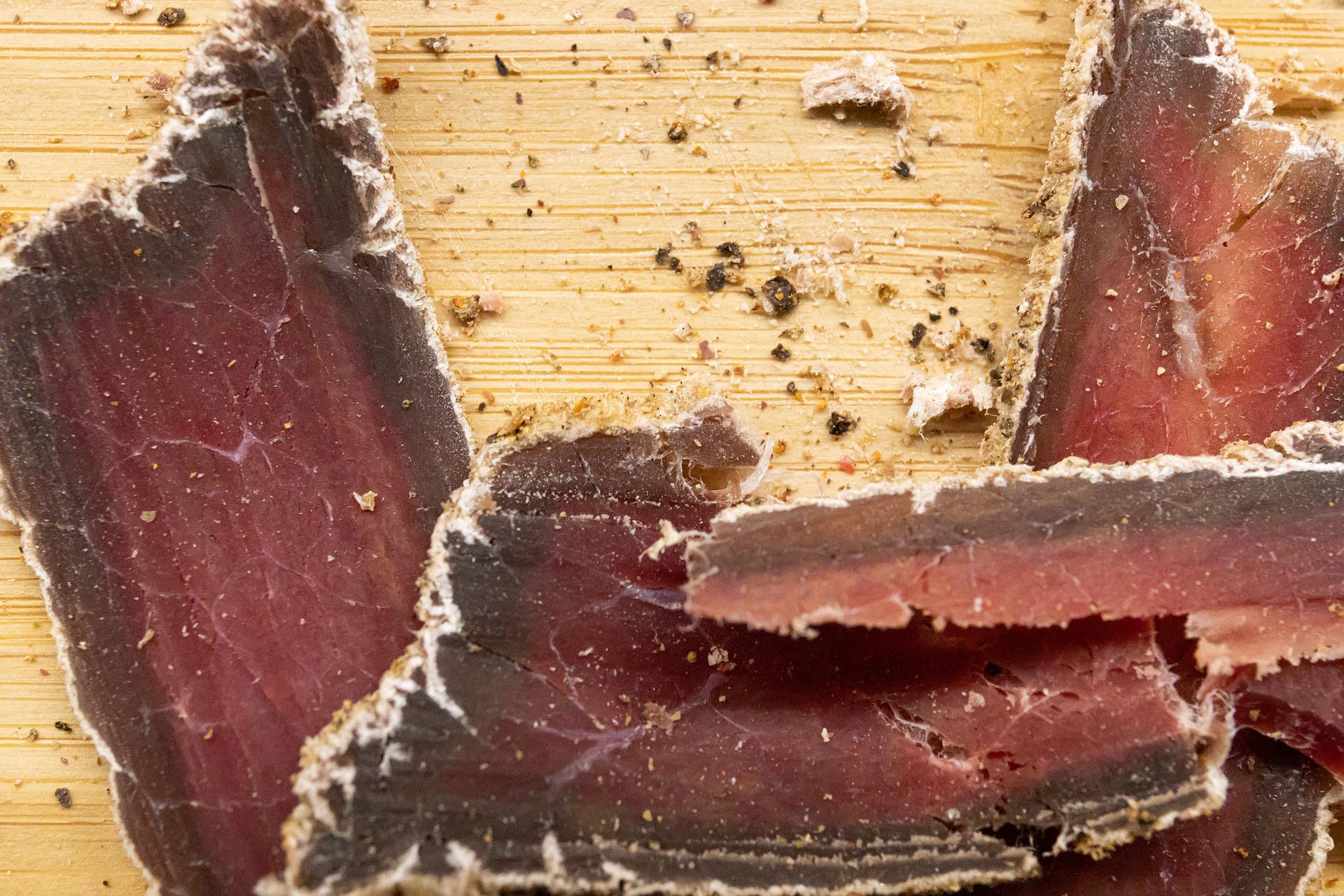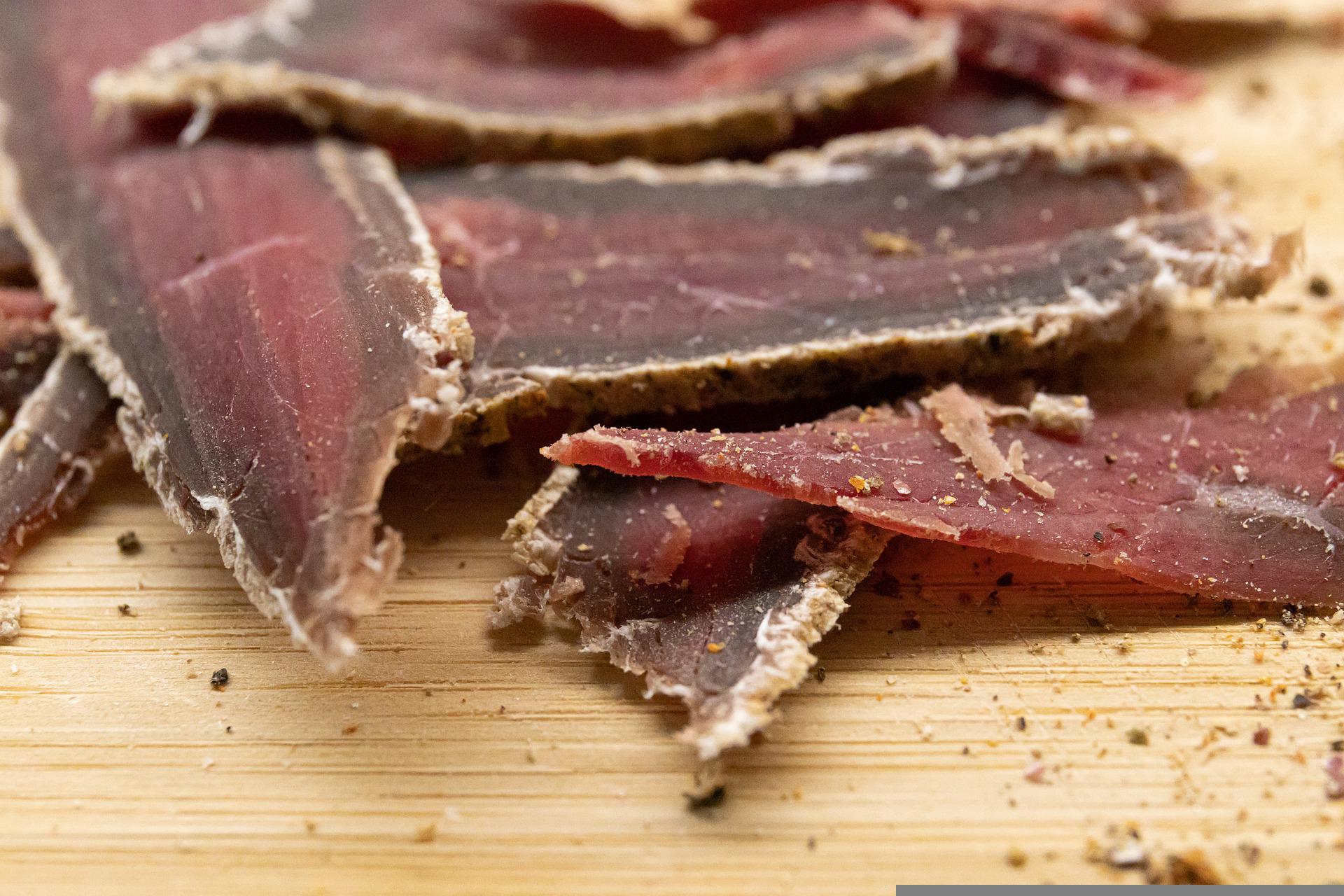If you’re looking for a delicious, gluten-free snack option, beef jerky is a great choice. Making your beef jerky at home is also a great way to control the ingredients and ensure that it’s truly gluten-free. Here’s how to make beef jerky gluten-free that’s both delicious and safe for those with celiac disease or gluten intolerance.

What Does It Mean By Gluten-Free?
Gluten-Free means that a product does not contain any gluten. Gluten is a protein found in wheat, rye, and barley. It can also be found in products that are made with these grains or that have come into contact with them during processing.
When a food is labeled “gluten-free,” it means that it has been tested and found to be free of gluten. This is important for people who have celiac disease or are sensitive to gluten.
Gluten causes small intestine damage in people with celiac disease. People with celiac disease must avoid all gluten-containing goods.
For people who are sensitive to gluten, even trace amounts can cause discomfort. Some people with sensitivities can eat products that are labeled “gluten-free,” while others may need to avoid all products that contain gluten.
If you’re looking for beef jerky that is safe for people with celiac disease or gluten sensitivity, this recipe is a great option! The ingredients are all naturally gluten-free, so you don’t have to worry about any unwanted gluten in your beef jerky.
How To Make Beef Jerky Gluten Free
Making your beef jerky is a great way to enjoy a tasty and healthy snack, and it’s even better when it’s gluten-free! This recipe uses simple ingredients that are all gluten-free, so you can enjoy your beef jerky without having to worry about any unwanted gluten.
To make the beef jerky, you’ll need:
- 1 pound of lean beef (sirloin or flank steak works well)
- 1/2 cup of gluten-free soy sauce
- 1/4 cup of apple cider vinegar
- 2 tablespoons of brown sugar
- 1 teaspoon of ground black pepper
- 1 teaspoon of garlic powder
- 1/2 teaspoon of onion powder
- 1/4 teaspoon of cayenne pepper (optional)
- 1/4 teaspoon of smoked paprika (optional)
Start by trimming any excess fat off of the beef. Cut the beef into thin strips, about 1/4 inch thick. In a large bowl, whisk together the soy sauce, brown sugar, apple cider vinegar, garlic powder, onion powder, black pepper, cayenne pepper, and smoked paprika.
Add the beef strips to the bowl and make sure they are all coated in the marinade. Cover the bowl with plastic wrap and refrigerate for at least 4 hours, or overnight.
When you’re ready to cook the beef jerky, preheat your oven to 175 degrees Fahrenheit. Line a baking sheet with parchment paper and arrange the beef strips on the sheet. Bake for 3-4 hours, or until the beef is dry and slightly chewy. Enjoy!
Advantages and Disadvantages Of Eating A Gluten-Free Food
There are many reasons why people choose to eat gluten-free foods. For some, it is a matter of health – they may have celiac disease or be allergic to gluten. Others may believe that gluten-free foods are healthier, even if they do not have a medical reason for avoiding gluten.
However, there are also some disadvantages to eating gluten-free. First, gluten-free foods can be more expensive than their conventional counterparts. This is because they often require special ingredients that are not found in traditional recipes. Additionally, some people find that gluten-free foods do not taste as good as they are used to. This is particularly true of baked goods, which often rely on gluten for their texture and flavor. Finally, eating a gluten-free diet can be inconvenient, as it requires careful label reading and menu planning.
Overall, the decision to eat gluten-free is a personal one. There are advantages and disadvantages to consider before making the switch. Those with celiac disease or a severe gluten allergy should avoid all products containing the protein. For others, the decision may come down to taste, cost, or convenience. Whatever the reason, there are
What’s the Best Type of Beef to Use?
When it comes to beef jerky, there are a few different types that you can use. The most important thing is to make sure that you’re using a lean cut of beef. This will help to ensure that your beef jerky is low in fat and calories.
Some of the best cuts of beef to use for jerky include:
- Sirloin
- Flank steak
- Top round
- Bottom round
- Eye of round
When choosing your beef, it’s also important to make sure that it’s fresh. Fresh beef will be a bright red color and should not have any brown or yellow spots. If you’re not sure if your beef is fresh, ask your butcher for help.
What’s the Best Way to Cook Beef Jerky?
There are a few different ways that you can cook beef jerky, but the most important thing is to make sure that it’s cooked all the way through. Undercooked beef jerky can be unsafe to eat.
The best way to cook beef jerky is in the oven. This method ensures that the beef is cooked evenly and prevents it from drying out.
To cook beef jerky in the oven, preheat the oven to 175 degrees Fahrenheit. Line a baking sheet with parchment paper and arrange the beef strips on the sheet. Bake for 3-4 hours, or until the beef is dry and slightly chewy. Enjoy!
How Should I Store Beef Jerky?
If you’re lucky enough to have some beef jerky on hand, you may be wondering how to best store it. After all, you want to make sure your jerky stays fresh and delicious for as long as possible.
Here are a few tips for storing beef jerky:
- First, avoid storing your beef jerky in direct sunlight. Sunlight can cause the flavor of the jerky to fade and the texture to become dry and brittle.
- Ideally, beef jerky should be stored in a cool, dark place. A pantry or cupboard is a perfect spot.
- Beef jerky can also be stored in the fridge, although it’s important to note that this may cause the flavor to mellow somewhat. If you prefer a more robust flavor, stick to storing your jerky at room temperature.
- Finally, make sure your beef jerky is stored in an airtight container. This will help to keep it fresh and prevent it from drying out.
Follow these tips and your beef jerky will stay fresh and delicious for weeks (if not months!) to come. Enjoy!
Conclusion
There you have it! Now you know how to make beef jerky that’s gluten-free, delicious, and healthy. So what are you waiting for? Get cooking!

